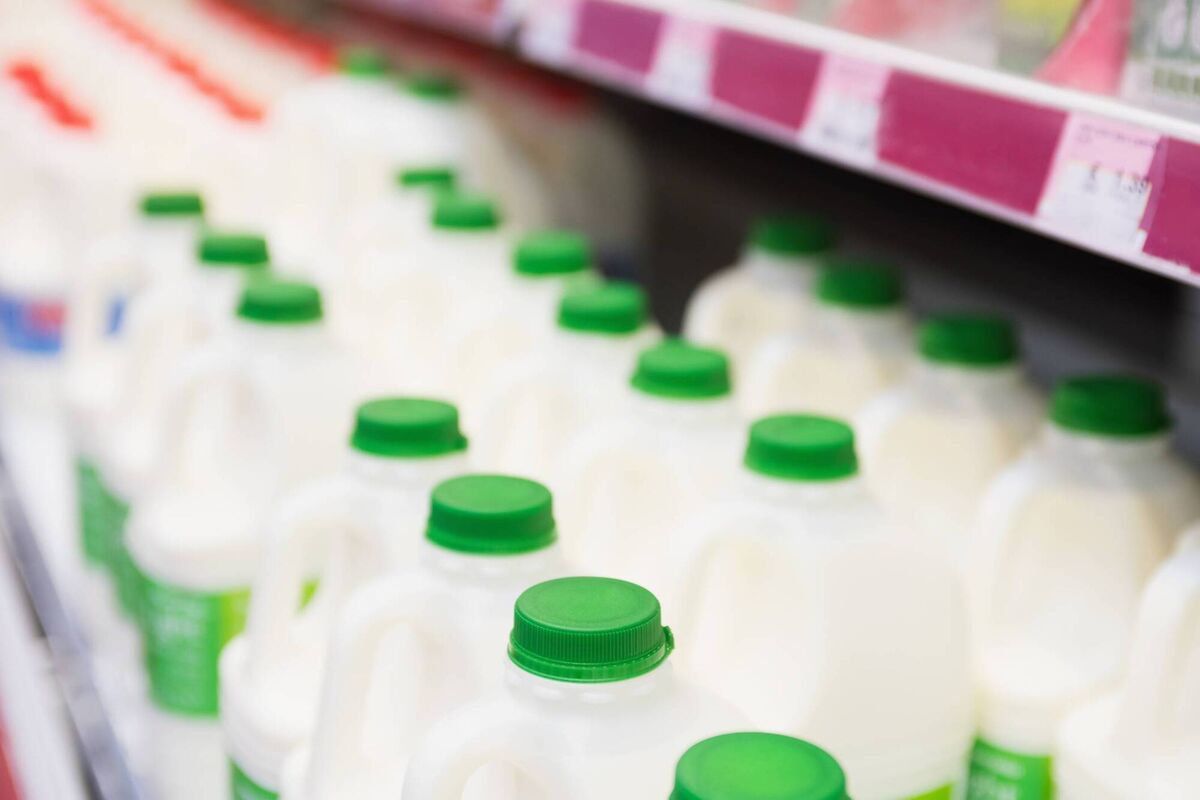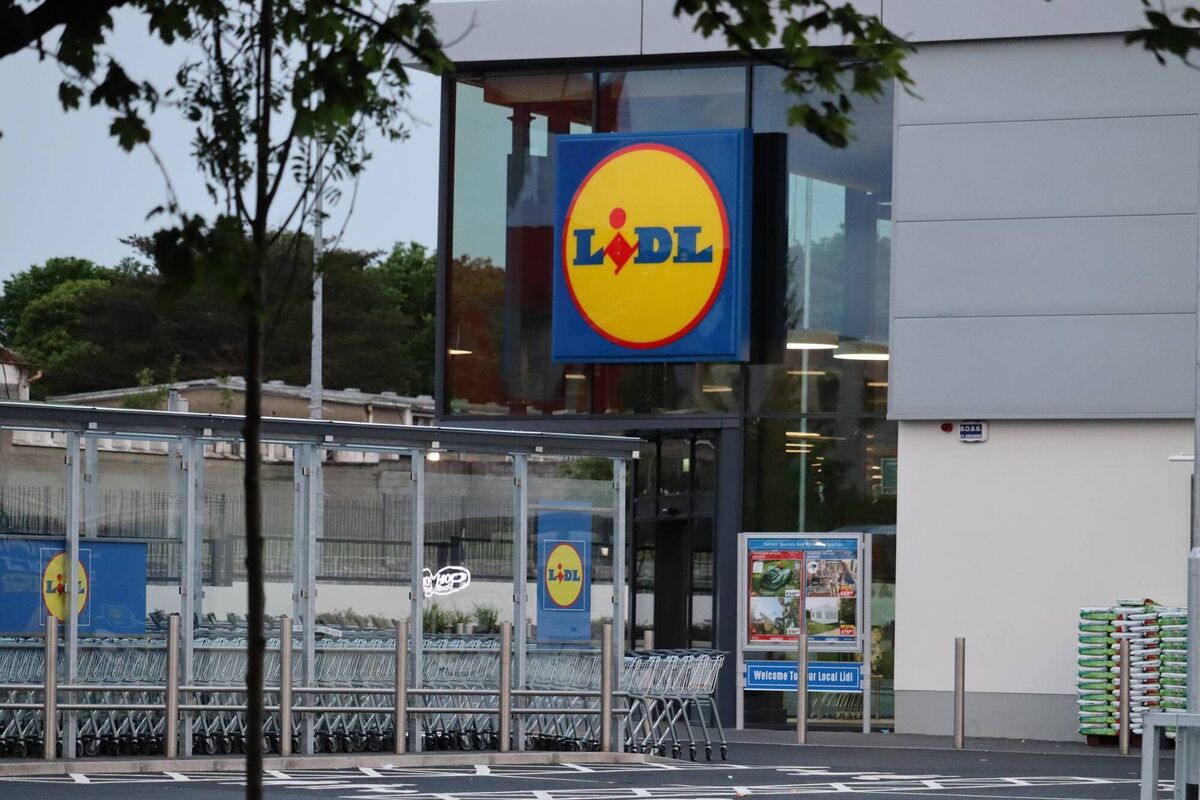The Irish supermarket price war: Is it real or just a pr battle?

Irish consumers spend an average of €1.1bn a month in supermarkets. The sector is one of the most competitive. Picture: iStock
Out of the blue last week, Lidl announced a price cut of 10c across all of its milk products. A small reduction, but in fear of losing even the slightest share of the market, every other major supermarket chain responded by matching the price reduction.
For almost every Irish household, milk is a staple item, and for many struggling to make ends meet, this cut might make just a little difference to them.
Being seen as the cheapest for staple goods is very valuable to these companies, as not only does it give them a public relations win, but it is potentially a big driver of getting people in the door, where they are likely to spend even more on higher-value items.

This is seen in Lidl’s announcement of the price cut. In its press release, the company said it is investing a total of “€20m on more than 300 price cuts on staple items such as pasta, cereals and convenience meals as well as nappies and pet food, to deliver on its commitment to never be beaten on price”.
The company is targeting everyday necessities for households, and flagging the price cuts well ahead of time puts the other supermarkets on edge. Tesco, Dunnes Stores, SuperValu, and Aldi have all responded with similar cuts, firing the opening shots of a price war to lure customers.
Speaking to the Irish Examiner, lecturer in accounting at UCC Dr Oliver Browne said the competing supermarkets are carrying out “retaliatory price cuts that match what they're seeing”.
“No more or less, they're basically mirroring each other,” he said.
"One company might even choose to go first on some of the things that they've seen Lidl do in order to try and get ahead of them but if they start cutting stuff that wasn't on Lidl's list. If they start cutting into beef, if they start cutting into some other products, that's where we could start seeing more tipping towards a price war. Where they go beyond the scope that was set out in essentially the battle lines,” Mr Browne said.
While the threat of a price war between supermarkets will be welcome to many households, any cuts these companies make will not be enough to make up for the price increases seen even over the last 12 months.
All these supermarkets may have dropped the price of their milk by 10c, but data from the Central Statistics Office (CSO) shows that in September, the average price of a two litre of full fat milk stood at €2.47, which is 27c more expensive compared to the same month last year.
The data from the CSO also shows that the cost per kg of striploin steak and sirloin steak has increased by over €5 over that 12-month period. The cost of fresh cod per kg increased by €3.87, while roast beef increased by over €3 per kg.
The largest price increases were seen in meat, but there were other items such as butter and cheddar cheese that increased by nearly 70c each over the last year.

While all these price increases are high, unfortunately, they are still increasing. A report last month from market research firm Worldpanel by Numerator found that annual grocery price inflation in Ireland stood at 6.3% in the 12 weeks leading up to September 7.
The move to cut the price of milk was criticised by farming organisations, who raised concerns about farmers being expected to take a lower price for their milk, and the product being used as a wider price and PR battle between the supermarket chains.
They were also worried that they would use price cuts on a small number of fresh foods in order to push a public relations campaign and drive more people to their stores, potentially hurting their members in the process.
On the milk price cut, Mr Browne said that Lidl don’t want to do this to cost themselves money, “they believe that the price of much is overpriced somewhere along the supply chain”.
“They, obviously, by cutting the price, know it's not them, or at least they're willing to pass it on. We know it's not the farmers, they make a bit of money, but like, that's mainly EU subsidies,” he said.
"The people profiting off of this are the middlemen.” "Supermarkets are being blamed for the margins going up, but they're saying it's not their fault that someone else is making this money.” He said meat in general, particularly minced beef, is already a loss leader for many of these supermarkets and further cuts to those would be a move to increase market share.
“If they choose to start losing money on that even more, then that's a market share move, and that's where a price war would start coming in,” he said.
Speaking to the Irish Examiner, Social Democrat TD Jennifer Whitmore said the price cut on milk shows that it is well within the capabilities of these supermarkets to cut prices.
She said she’d like to see the Government take action and give the Agri-Food Regulator more powers to investigate where price increases are coming from in the supply chain.
“The Agri Food Regulator hasn't been given the teeth. They requested last September for additional powers from the Government. Considering the pressure that has been put on families and from grocery prices and the inflation that we're seeing in groceries, it is absolutely incredible that the government still hasn't done that.
"We don't want this impacting at the farm gate, there's middlemen all along that chain that are making a lot of money, and we need transparency around that,” she said.
The five main supermarket companies are profitable but delving into their finances is very difficult as they are all subject to different financial reporting standards.
Tesco, for example, is a public company headquartered in the UK and is required to publish its results. According to half-year results published earlier this month, total revenue in the Republic of Ireland grew by more than 6% to €1.77bn.
Dunnes Stores, which is the largest supermarket chain in the country, is a private unlimited company and as a result is not required to publish financial statements at the end of the year.
|
IRISH SUPERMARKET SHARE |
|
|---|---|
|
Dunnes Stores |
23.9% |
|
Tesco |
23.7% |
|
SuperValu |
19.5% |
|
Lidl |
14.2% |
|
Aldi |
11.6% |
The Musgrave Group - which owns SuperValu, Centra, and Mace, among others - does publish annual results but as of writing the most recent one available was from 2023. That year, the group saw turnover reach €5bn while profit after tax hit €103.9m.
The German supermarket Aldi also publishes its results but once again the latest figures available are from 2023. It shows that sales at the discount retailer rose to €2.1bn that year but its pre-tax profits fell 2.1% to €16.83m.
Lidl, on the other hand, doesn’t publish its results for Ireland. It is a part of the German private company the Schwarz Group.
In August, the Competition and Consumer Protection Commission (CCPC) published an analysis of the Irish grocery retail sector in which they found “no indications of market failure or excessive pricing due to abuse of dominance, noting that competition had improved in recent years with more choice for consumers and increased entry by retailers”.
“While food prices in Ireland remained high internationally, food inflation during the period analysed had been the lowest in the EU, and available data did not suggest unusually high profit margins among retailers.”
The report also looked into the profit margins of supermarkets in Ireland and found that Tesco’s operating profit margin, in the year to February 2024, to be 3.7% - down from 4% the previous year. Musgrave’s profit margin in 2023 was 2.4%, down from 2.5% while Aldi’s profit margin in 2023 was 0.8%, down from 0.9% in 2022.
“Thus, all three groups have reported declining profitability (albeit marginal) in their latest financial results,” the CCPC said.
However, Mr Browne noted that these margin figures are the “net margin” and as we don’t see the full financial documents of these companies it is difficult to see where the money is being spent and saved in order to keep those margins.
“They're able to manage those margins by distributing investment to new branches, and investing in upgrading branches. The margin that they would have to play with is limiting the amount of investment that would go into renovating older stores, or investing in new technology in those stores,” he said.
Groceries are one of the biggest monthly expenses for many households. In the year to the end of August, Irish consumers spent on average about €1.1bn a month in domestic supermarkets, according to card payment data from the Central Bank of Ireland.
This is only expected to increase over the coming months as the Christmas period approaches.
On cards alone, Irish consumers spent over €8.7bn in supermarkets in the first eight months of the year.
According to the latest data from Worldpanel by Numerator, as of September, Dunnes Stores has the highest share of consumer grocery spending in the country at 23.9%. Tesco was in second place with a market share of 23.7%, while SuperValu held a share of 19.5%.
Lidl and Aldi held a market share of 14.2% and 11.6%, respectively.
Increasing market share for these companies, even by a little, can be worth far more in the long run than the amount lost by cutting prices on a few staple items. Whether this recent price spat devolves into an all-out price war is yet to be seen but consumers across the country can hope for a little relief given the rising prices seen over the last few years.












